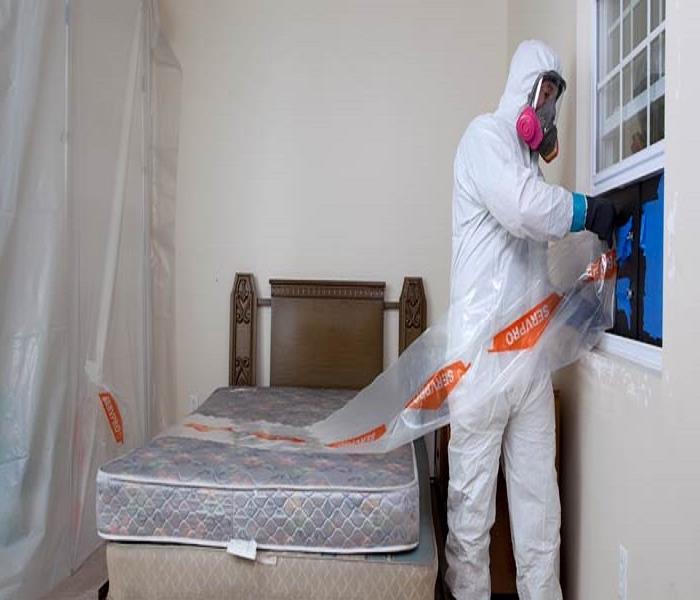Recent Biohazard Posts
Blog 5: Recommendations for Property Owners
6/8/2020 (Permalink)
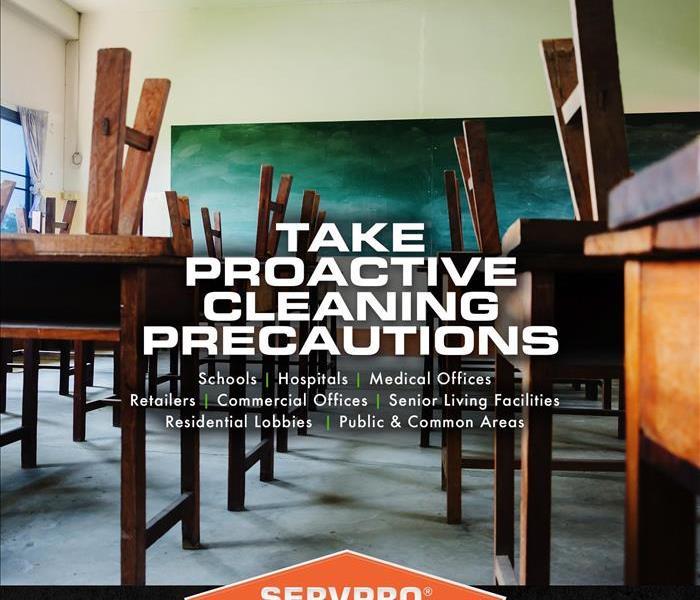 SERVPRO of Mandarin can help your business or commercial building keep your employees and guests safe by following CDC guidelines.
SERVPRO of Mandarin can help your business or commercial building keep your employees and guests safe by following CDC guidelines.
Recommendations for Property Owners
Beyond the cleaning and disinfecting performed by SERVPRO of Mandarin, property owners must understand that persons infected with the SARS-CoV-2 virus and/or COVID-19 that enter their property will potentially infect others and deposit the virus on surfaces.
According to the CDC, the virus is thought to spread mainly from person-to-person. This could be between people who are in close contact with one another (within about 6 feet) or through respiratory droplets produced when an infected person coughs or sneezes. These droplets can land in the mouths or noses of people who are nearby or possibly be inhaled into the lungs. It may be possible that a person can get COVID-19 by touching a surface or object that has the virus on it and then touching their own mouth, nose, or possibly their eyes, but this is not thought to be the main way the virus spreads.xxvii
The CDC has set up a webpage titled Preventing COVID-19 Spread in Communities which addresses homes, childcare, and K-12 schools, colleges and universities, work environments, healthcare settings, and large community events and mass gatherings.
For business purposes, the CDC recommends routine environmental cleaning. This should include routinely cleaning all frequently touched surfaces in the workplace, such as workstations, countertops, and doorknobs; and provide disposable wipes so that commonly used surfaces (for example, doorknobs, keyboards, remote controls, desks) can be wiped down by employees before each use.xxviii For structures that utilize an internal or external janitorial crew, it is recommended that they follow proper cleaning protocols established by the CDC.
xxvii https://www.cdc.gov/coronavirus/2019-ncov/about/transmission.html
xxviii https://www.cdc.gov/coronavirus/2019-ncov/specific-groups/guidance-business-response.html
Blog 4: Clean up Procedures Related to COVID-19
6/4/2020 (Permalink)
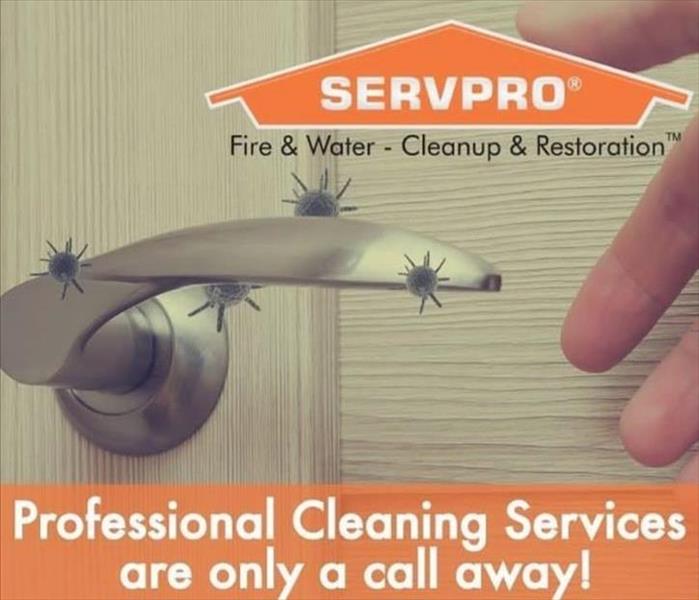 Call SERVPRO of Mandarin, 904-636-0044 for a free review of cleanup procedures designed for your facility.
Call SERVPRO of Mandarin, 904-636-0044 for a free review of cleanup procedures designed for your facility.
Clean up Procedures
These procedures focus on the critical role cleaning plays in preventing the transmission of viruses, such as Coronavirus. Cleanup procedures may vary depending on the environment, but the general guideline includes [1] disinfectant selection, [2] cleaning and sanitizing of porous and non-porous surfaces, [3] disinfecting of non-porous surfaces, [4] cleaning and disinfecting of equipment, tools, and/or supplies used for cleanup process, [5] post clean up evaluation, and [6] disposal of waste.
1. Disinfectant Selection
The CDC recommends usage of a disinfectant with the EPA-approved emerging viral pathogens claim. As of the date of this publication, there are no disinfectants that have been tested specifically for use against novel coronavirus SARS-CoV-2, the Cause of COVID-19. However, disinfectant manufacturers (including SERVPRO) are working with the EPA to have the emerging viral pathogen claim added to existing products that are designed to kill viruses similar to SARS-CoV-2.
2. Cleaning and Sanitizing of Porous and Non-porous Surfaces
The CDC describes cleaning as removing germs, dirt, and impurities from surfaces or objects. Cleaning works by using a detergent and water to physically remove germs from surfaces. This process does not necessarily kill germs, but by removing them, it lowers their numbers and the risk of spreading infection.xx
Some materials cannot be cleaned with detergent and water without being damaged. For this reason, paper and paper products are not able to be cleaned and/or disinfected. Cleaning methods typically used on water sensitive materials such as vacuuming or dry sponging would not be capable of removing enough soil and residue to be effective.
For soft (porous) surfaces such as carpeted floor, rugs, and drapes, remove visible contamination if present and clean with appropriate cleaners indicated for use on these surfaces.xxi Surfaces that are not water sensitive, can be wet cleaned using a Hot Water Extraction or Deluxe Preconditioner and Rinse method. Upholstered items and carpets can be sanitized with certain disinfectants.
Affected laundry/linen items should be minimally handled. If the items can be laundered, SERVPRO of Mandarin will launder items in accordance with the manufacturer’s instructions using the warmest appropriate water setting for the items and then dry items completely. Otherwise, SERVPRO will use products with the EPA-approved emerging viral pathogens claims that are suitable for porous surfaces.xxii
• SERVPRO will wash items as appropriate in accordance with the manufacturer’s instructions, and if possible, will launder items using the warmest appropriate water setting for the items and dry items completely. Dirty laundry that has been in contact with an ill person can be washed with other people’s items.xxiv
• SERVPRO will clean and disinfect hampers or other carts for transporting laundry according to the guidance above for hard or soft surfaces.xxv
Non-porous materials like hard surface floors, cabinets, countertops, doorknobs, and plumbing fixtures can be wet cleaned using a variety of SERVPRO hard surface cleaners (general-purpose cleaners) and cleaning methods. All cleaning procedures will be performed in such a manner as to minimize the splashing, spraying, spattering, falling, aerosolization, cross-contamination, migration, and generation of infectious material. We will avoid cleaning techniques such as pressurized air or water sprays, which may generate droplets or bioaerosols.
3. Disinfecting of Non-porous Surfaces
The CDC describes disinfecting as killing germs on surfaces or objects. Disinfecting works by using chemicals to kill germs on surfaces or objects. This process does not necessarily clean dirty surfaces or remove germs, but by killing germs on a surface after cleaning, it can further lower the risk of spreading infection.xxvi
The application method should be selected based on surface type, location of surface, amount of surface area, and manufacturer recommended application method. Disinfectants can be applied using a saturated towel, spray bottle, pump-up sprayer, electric sprayer, ULV Mister, or electrostatic sprayer. SERVPRO follows label directions for application and maintaining wet contact or dwell time as indicated by the manufacturer, which is critical.
Our technicians will be careful to prevent the overwetting of electronic items, such as phones and computers to prevent potential damage.
4. Cleaning and Disinfecting of Equipment, Tools, and/or Supplies Used for Cleanup Process
Any equipment, tools, and/or supplies used by SERVPRO of Mandarin for the cleanup process will be cleaned and disinfected using the cleaning methods described in steps 1 and 2. This is to ensure that potential contamination is not moved to other parts of the structure.
5. Post Clean Up Evaluation
At the time of this publication, there is no available surface test for the SARS-CoV-2 virus. There is currently no way to measure the effectiveness of the disinfection of SARS-CoV-2.
6. Disposal of Waste
SERVPRO of Mandarin will follow all applicable federal, state, provincial, and municipal laws regarding the packaging, transportation, and disposal of medical waste. All disposable PPE (i.e. gloves, disposable respirators, coveralls), cleaning towels, and other waste will be bagged and sealed within the work area.
xx https://www.cdc.gov/flu/school/cleaning.htm
xxi https://www.cdc.gov/coronavirus/2019-ncov/community/organizations/cleaning-disinfection.html
xxii https://www.cdc.gov/coronavirus/2019-ncov/community/organizations/cleaning-disinfection.html
xxiv https://www.cdc.gov/coronavirus/2019-ncov/community/organizations/cleaning-disinfection.html
xxv https://www.cdc.gov/coronavirus/2019-ncov/community/organizations/cleaning-disinfection.html
Blog 3: Isolation and Ventilation Related to Viral Decontamination
6/1/2020 (Permalink)
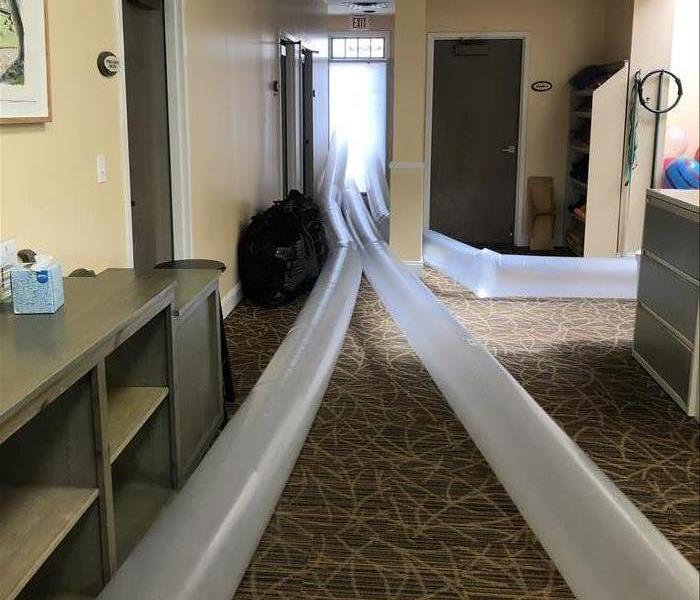 SERVPRO of Mandarin installs temporary ductwork to help ventilate the affected area, to cycle fresh air in from the outside.
SERVPRO of Mandarin installs temporary ductwork to help ventilate the affected area, to cycle fresh air in from the outside.
Isolation and Ventilation
Feasible engineering and work practice controls will be utilized by SERVPRO of Mandarin during viral decontamination services to minimize employee exposures to airborne infectious disease. Examples of engineering controls include airborne infection isolation rooms (AIIR), exhaust ventilation, air filtration, and air disinfection.xii
We will close off areas used by the ill persons and wait as long as practical before beginning cleaning and disinfection to minimize the potential for exposure to respiratory droplets.xiii This is normally accomplished by closing doors or erecting critical barriers with 6 mil polyethylene sheeting to facilitate source containment. The work area shall be locked when unattended. A Biohazard sign can be provided by SERVPRO of Mandarin and be posted at any potential entry point to the work area.
The CDC recommends opening outside doors and windows to increase air circulation in the area. If possible, we will wait up to 24 hours before beginning cleaning and disinfection.xiv Based on existing bioremediation standards, there is value in controlling airflow from affected to unaffected areas. To control the spread of aerosolized contamination, workers can put the contaminated area under HEPA-filtered negative air pressure. This air should be exhausted outside the structure when practical. If possible we will engineer an air change rate of ≥6 mechanical air changes per hour (ACH).xvi
If utilizing negative pressure, pressure differentials will be monitored to ensure that air is always flowing from the surrounding area into the work area. Negative pressure can be monitored either continuously or periodically. Monitoring methods include chemical aerosols (e.g., smoke tube), differential pressure-sensing devices (e.g., manometer), and physical indicators (e.g., flutter strips).xvii If using a manometer, it is recommended to achieve a pressure differential of ≥0.01 inch of water gauge.xviiixix
xii https://www.dir.ca.gov/dosh/coronavirus/
xiii https://www.cdc.gov/coronavirus/2019-ncov/community/organizations/cleaning-disinfection.html
xiv https://www.cdc.gov/coronavirus/2019-ncov/community/organizations/cleaning-disinfection.html
xvi https://www.cdc.gov/mmwr/preview/mmwrhtml/rr5417a1.htm
xvii https://www.cdc.gov/mmwr/preview/mmwrhtml/rr5417a1.htm
xviii https://www.cdc.gov/mmwr/preview/mmwrhtml/rr5417a1.htm
xix https://www.cdc.gov/infectioncontrol/guidelines/environmental/background/air.html
Blog 1: Protocol and Planning for COVID-19 Positive Decontamination
5/18/2020 (Permalink)
Cleanup Scope of Work and Planning
The CDC encourages cleaning of high touch surfaces such as counters, tabletops, doorknobs, bathroom fixtures, toilets, phones, keyboards, tablets, and tables at a minimum.vii These same surfaces are mentioned in the CDC's guidance for commercial spaces as well. viii Building and spaces greatly differ. Each location will require individual planning. Cleaning removes the soil and dirt that harbors the infectious agents while disinfecting kills the remaining environmental pathogens.ix Cleaning of visibly dirty surfaces followed by disinfection is a best practice measure for the prevention of COVID-19 and other viral respiratory illnesses in community settings.x Both cleaning and disinfecting are a part of SERVPRO of Mandarin's scope of work and plan. The cleanup scope is dependent on the type of coronavirus situation.
1. High Touch Cleanup: Cleanup of high touch surfaces is required for a situation involving a person who is suspected to have COVID-19 or a Person Under Investigation (PUI); which is someone who is involved in a quarantine situation or has come in contact with someone who has been in a quarantine situation, or has come in contact with someone testing positive. This includes cleaning and disinfecting of high touch nonporous surfaces and cleaning and sanitizing of high touch porous surfaces.
2. Enhanced Cleanup: Enhanced cleanup is required for an area in which a person who has been confirmed positive for COVID-19 has inhabited. This includes cleaning and disinfecting of all nonporous surfaces and cleaning and sanitizing of all porous surfaces. This enhanced cleaning includes walls up to 8 feet (breathable air) but excludes ceilings.
A combination of High Touch Cleanup and Enhanced Cleanup may be needed within a structure based on where the infected individual has directly traveled or occupied.
Some items may need to be pretested to determine if cleaning and disinfecting are possible without causing damage. SERVPRO of Mandarin is always cautious of valuable pieces of art; some cleaning processes could cause damage to these items. A part of the scope of work will include protective measures such as isolation and containment, safety training, personal protective equipment, and supervision of safe work practices to ensure the health and safety of occupants and workers. The scope of work will be created and agreed upon by YOU, the customer, and the SERVPRO of Mandarin to ensure a set of agreeable expectations. The customer needs to acknowledge that cleaning and disinfecting will only apply to the current state of the structure and contents. This will be documented with the form Request for Cleaning and Disinfection to Limit the Survival of Emerging Viral Pathogens - including Coronavirus 3-10-2020. The structure would not be protected from future SARS-CoV-2 contamination if an infected person were to enter and occupy the building after disinfection.
vii https://www.cdc.gov/coronavirus/2019-ncov/if-you-are-sick/index.html?CDC_AA_refVal=https%3A%2F%2Fwww.cdc.gov%2Fcoronavirus%2F2019-ncov%2Fhcp%2Fguidance-prevent-spread.html
ix https://www.issa.com/education/cleaning-for-infection-prevention
x https://www.cdc.gov/coronavirus/2019-ncov/community/organizations/cleaning-disinfection.html
Blog 2: Protecting You and Our Employees With Proper PPE and Training
5/18/2020 (Permalink)
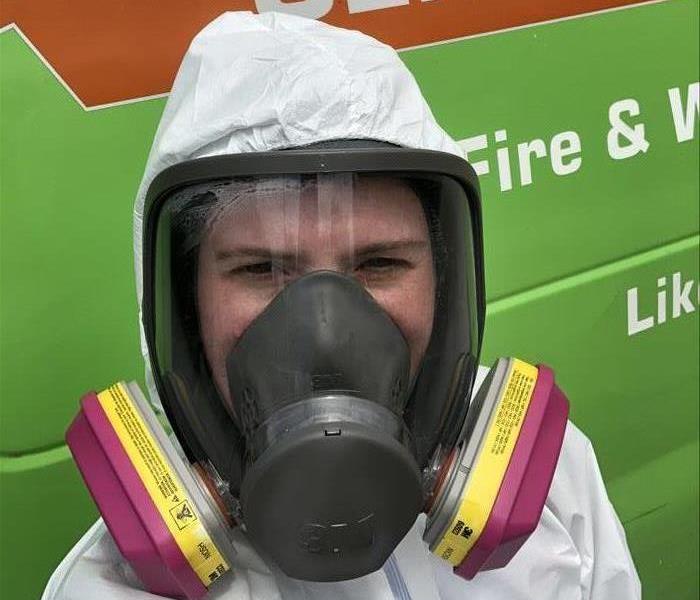 Our team is trained and prepared in safety and protective equipment to help keep YOU, our customers, and US safe.
Our team is trained and prepared in safety and protective equipment to help keep YOU, our customers, and US safe.
Worker Safety Training
SERVPRO of Mandarin takes great responsibility to help ensure employees entering and working in areas contaminated with biological or infectious matter or in designated areas where contaminated contents are being handled and decontaminated have received proper training and personal protective equipment (PPE).
Our safety training includes hazard communication, proper PPE selection, proper donning and doffing procedures, proper personal hygiene, and incident reporting.
• Hazard communication: Inform workers of hazards related to the work being performed, chemicals they will be using, and the importance of PPE usage.
• Proper PPE selection: Inform workers that personal protective equipment is required within the work area. Inform workers that they will be wearing respiratory protection, disposable coveralls, eye protection, and hand protection. Inform workers that coveralls and gloves are disposable and should be changed prior to re-entering the work area. Inform workers on the cleaning and decontamination process required for any reusable PPE.
• Proper donning and doffing procedures - Inform workers that personal protective equipment must be put on and taken off following a specific procedure.
• Proper personal hygiene – Inform workers that specific hygiene practices must be followed.
• Sign In/Out: Inform workers they will be required to sign in and sign out of the work area.
• Incident reporting – Inform workers that any exposure to infectious materials (skin, eye, mouth, mucous membrane) must be reported to the supervisor immediately. If contact with blood or Other Potential Infectious Material (OPIM) occurs, skin must be washed with soap and water or eyes, and mucous membranes flushed with water immediately.
Personal Protective Equipment (PPE)
Personal protective equipment (PPE) should be selected and used to maintain worker health and safety.
• Respirators: Due to potential respiratory exposure, at a minimum, an N-95 respirator should be worn by all workers. Tight-fitted respirators may also be worn including half-mask respirators or full-face respirators; with P100 filters.xi This includes air-purifying respirators (APR) and powered air-purifying respirators
(PAPR). An APR or PAPR is recommended for Enhanced Cleanup.
• Coveralls: Coveralls with attached hood and boots should be worn by all workers. For added protection, other options such as disposable non-permeable coveralls with a separate boot cover or disposable non-permeable coveralls with built-in booties may be considered. All coveralls should have a storm flap over the front zipper. The appropriate size is typically coat size or coat size plus one. Recommend XL and XXL sizes.
• Gloves: Disposable gloves, 4-mil nitrile should be used for outer glove and a 5-mil nitrile long-cuff glove for the inner glove. Two different color gloves, one for inner and one for outer, would allow for tears to be noticeable; this is recommended but not required.
• Tape: Tape should be used to seal gloves to coveralls.
• Face Shield or Goggles: If using an N-95 or half-mask respirator, eye protection should include a face shield or goggles.
A designated area will be established for donning and doffing PPE outside the work area. All donning and doffing will take place in this designated area. This area will have to be cleaned, disinfected, and maintained. Donning procedures will be established and adhered to throughout the cleaning and disinfecting process. Cleanup personnel will don PPE prior to entering the work area and engaging in cleaning and disinfecting surfaces, and/or manipulating contents. Donning procedures will be observed by trained personnel. During the cleaning and disinfecting process, cleanup personnel will keep their PPE on while working in the space. Cleanup personnel will avoid touching any exposed skin while working to limit dermal exposure. Doffing procedures will be established and adhered to throughout the cleaning and disinfecting process. When removing PPE and other soiled materials, we will not allow the outer surfaces of PPE and other soiled materials to contact bare skin. Doffing procedures will be observed by trained personnel. Personal hygiene best practices will be observed after exiting the workspace.
xi https://www.dir.ca.gov/title8/5144.html
Biohazard and Vandalism Clean-Up Tips
1/1/2020 (Permalink)
For almost 40 years SERPVRO of Mandarin has helped south Jacksonville homeowners and businesses with fire, smoke and water damage clean up. But did you know that SERVPRO of Mandarin professionals are trained and certified in Bio-Hazard clean up? Here are some helpful tips on what to do until help arrives if you experience crime scene, vandalism or bio-hazard damage in your home or business.
VANDALISM DAMAGE
DO:
· Hose or wash egg damage from your building exterior as soon as possible
· Vacuum glass particles from carpets
· Save containers which reveal the ingredients of spilled inks, cosmetics, and paints
DON’T
· Don’t attempt to remove ink, paint or cosmetic stains.
· Operate damaged lamps or appliances
· Discard furniture wood chips, broken pieces from porcelain, furniture or art objects.
Harmful Waste
(Sewage, bloodborne pathogens, etc.)
DO:
· Stay out of affected areas
· Call emergency service personnel if the situation is life-threatening
· Treat all bodily fluids as if they are contaminated.
DON’T
· Attempt cleanup of any kind
· Touch or handle items that might be contaminated with bodily fluids.
These Emergency Tips will assist you in taking the proper actions until SERVPRO of Mandarin professionals arrive at your home or business.
Please follow these Dos and DON’Ts to help reduce damage and increase the chances of a successful restoration. Call SERVPRO of Mandarin at 904-636-0044 for assistance with any Bio-Hazard cleanup. We are available 24/7/365 to serve all Jacksonville residents and businesses.
SERVPRO of Mandarin Biohazard Clean Up Services
6/10/2016 (Permalink)
Accidents can happen anywhere and at any time. SERVPRO of Mandarin is here to help you with all of your home or business property damage restoration needs. Our professional technicians are trained to handle all types of biohazard waste disposal. Services range from suicide, crime scene and vandalism, homicide and accidental death cleanup to sewage cleanup and a host of different sanitation clean up services. Our biohazard property restoration services also include filth cleanup and packrat cleanup services.
SERVPRO of Mandarin technicians are highly trained in rapid response. We work with experience, skill and most importantly, compassion. We're on call 24 hours a day, 7 days because your property and peace of mind depend on it! Call 904-636-0044 now!
 SERVPRO of Mandarin can help your business or commercial building keep your employees and guests safe by following CDC guidelines.
SERVPRO of Mandarin can help your business or commercial building keep your employees and guests safe by following CDC guidelines.

 24/7 Emergency Service
24/7 Emergency Service



